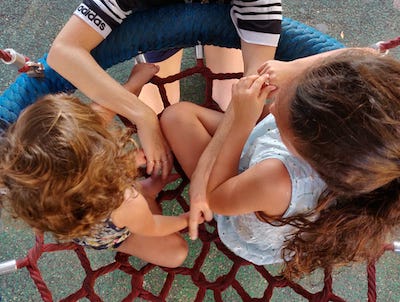The Love Pie: How Do We Slice Up Love For Our Children? by Ori Lenkinski

*originally published in Hebrew in Haaretz
When I interview established choreographers, I often ask if they have a favorite creation from their body of work. Usually, they answer very quickly. “The new one,” they respond. They often go on to explain that it isn’t because it’s the best or the most loved but because it requires the most attention and is, thanks to its newness, the most exciting.
Growing up as a second child, I often wondered what part of the love pie I occupied for my parents. Was my slice equal to my sister’s? Was it possible that they loved one of us more than the other?
When I was pregnant with my second child, my husband mentioned that we would finally discover the great mystery of parenting: is one child more loved than another? Is there a favorite?
What I have learned and continue to learn every day is that love comes in many flavors. The love I have for my first and the love for my second feel different, they have different sounds, different textures, different aromas. The tension each child creates, both positively and negatively, are completely unique. But the love for each is a whole entity, just as they are whole people, albeit little ones.
That said, if I was to create a pie chart of the time I spend looking at each one of them, the little one’s slice would be much larger. She’s small, she falls down, she needs constant supervision. She puts dangerous, round things in her mouth, draws on the wall, smears apple sauce on the sofa. The big one is more settled, stable, consistent. And so, though I do not love the little one more, she draws more of my attention, creating an inequality in our home.
I fret about this differentiation quite often. How does it read to the bigger one? Does she notice that our eyes are on her less? That the camera lens is less trained on her? And if so, how does it affect her?
When the little one was born, the big one had a growth spurt. She got taller, spoke more eloquently, ate new foods and learned new games. Her heart grew to include another person, making space for a new love. This process was not altogether blissful, it was uncomfortable at times and, like with any growth, came with its share of pains. That said, the benefits of having a sister are clear but I wonder if the toll it took on our attention towards her caused a sadness. I am the second child of two so I have no experience in her current position.
How can I communicate to her that, while I am looking at her little sister, her place in my heart is certain, etched in stone, unmoved? Do children have the ability to perceive that love flows in their direction even if our eyes are focused elsewhere?
I recently premiered a new work, my fourth in the last decade. When people talk to me about this work, especially if they complement it, a small part of me feels guilty towards my previous works. I don’t love them less, am no less proud of them, they are no less dear to me, they are just older and so, get less attention.
